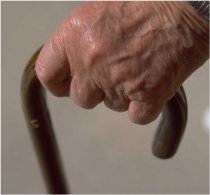 A new study published in the Journal of the American Medical Association has turned up mixed results regarding testosterone supplementation in older men. The Dutch researchers found that men with low testosterone levels who received testosterone supplementation increased lean body mass and decreased body fat, but were no stronger and had no improvement in mobility or cognition compared with men who did not use the supplement.
A new study published in the Journal of the American Medical Association has turned up mixed results regarding testosterone supplementation in older men. The Dutch researchers found that men with low testosterone levels who received testosterone supplementation increased lean body mass and decreased body fat, but were no stronger and had no improvement in mobility or cognition compared with men who did not use the supplement. Decline in testosterone is associated with a decrease in muscle mass and muscle strength, cognitive decline, a decrease in bone mass, and an increase in (abdominal) fat mass. The new study assessed the effects of testosterone supplementation on functional mobility, cognition, bone mineral density, body composition, lipids and quality of life in older men with testosterone levels less than 13.7 nmol/L (less than the average level in this age group) over a period of six months.
Led by Marielle H. Emmelot-Vonk, the researchers found that lean body mass increased and fat mass decreased in the testosterone group but these factors were not accompanied by an increase of functional mobility or muscle strength. Cognitive function and bone mineral density did not change. Quality-of-life measures did not differ but perhaps most importantly, there were also no differences in prostate state between the two groups.
"This study is, as far as we know, the largest study of testosterone supplementation with the most end points and a randomized, double-blind design. Adherence was high and the dropout rate was low," Emmelot-Vonk writes. "The findings in this study do not support a net benefit on several indicators of health and functional and cognitive performance with 6 months of modest testosterone supplementation in healthy men with circulating testosterone levels in the lower range."
Related:
Manopause
Testosterone Therapy Bereft Of Supportive Evidence
Short-Term Testosterone Use Pronounced Safe
Exercise Boosts Testosterone
Source: Journal of the American Medical Association

